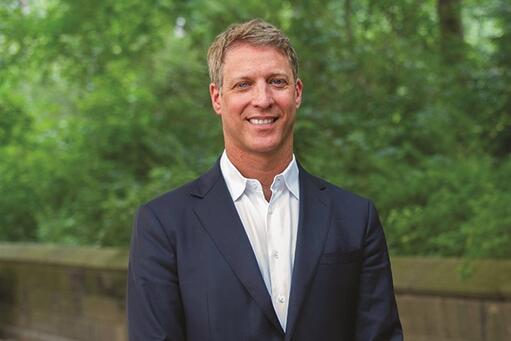Ron Gonen ’04

THE CIRCULAR ECONOMY BUILDER
RON GONEN IS invested in ushering out one aspect of business that he argues is no longer tenable: companies offloading their waste onto the public. After serving as the deputy commissioner of sanitation, recycling, and sustainability for the Bloomberg administration, Gonen founded Closed Loop Partners to invest in building the circular economy.
“There’s a disequilibrium that exists today: Companies are able to make a lot of money manufacturing their products,” Gonen says, “but then they push off the costs associated with those products’ waste to the commons.” After all, he explains, companies are not asked to pay for the landfills or sanitation systems that manage their used products; taxpayers are.
Proponents of a circular economy ask companies to account for the collective costs of the waste they produce. Doing so creates incentives for businesses to use processes and materials that are higher quality and less resource intensive, and to strive to reduce waste by designing products that can be repeatedly reused or upcycled.
Closed Loop Partners invests in the technologies, materials, and recycling infrastructure necessary to get there. With $400 million in assets under management and investments in 60 portfolio companies across eight countries and 25 US states, Closed Loop Partners reports that its investments have already helped avoid 6.8 million tonnes of greenhouse gas emissions and kept 3.6 million tons of materials in circulation. The firm makes venture capital, growth equity, and private equity investments in companies around the world, and offers project-based finance to build up recycling and circular-economy infrastructure across North America. The Closed Loop Ventures Fund has taken stakes in Dimpora, a Switzerland-based company developing sustainable membranes for outdoor gear; HomeBiogas, an Israel-based company creating anaerobic digester units to convert organic waste into renewable energy and fertilizer; and Thrilling, a Los Angeles-based Internet marketplace that curates items from online boutique vintage clothing stores across the US, increasing access to reusable fashion.
Gonen says creating a true circular economy will require the scaling up of various types of businesses, new infrastructure and materials, and buy-in and support from other sectors of society. “We need to create a system where companies that put products into the market are responsible for those products,” Gonen says. “If we have that kind of system, companies will innovate around the materials they use, the recycling systems they fund, and processes to make sure their products eventually come back to them — because if not, it’ll go to a landfill, which they should be financially responsible for.”
Of course, he concedes, that’s not yet the system that companies are operating within, and policy intervention will probably be necessary to get there. At the same time, he points out, some of the world’s largest retailers and consumer goods companies have invested in Closed Loop Partners (including Microsoft, Nestle, PepsiCo, and Unilever), and many others are investing in circular processes of their own, indicating a growing acceptance of the circular economy’s core tenets.
“We still need to make the case for the circular economy,” Gonen says, “but it’s becoming more mainstream, and we’re quickly getting to a place where the case no longer needs to be made. Things are changing fast, but we’re not yet where we need to be.”